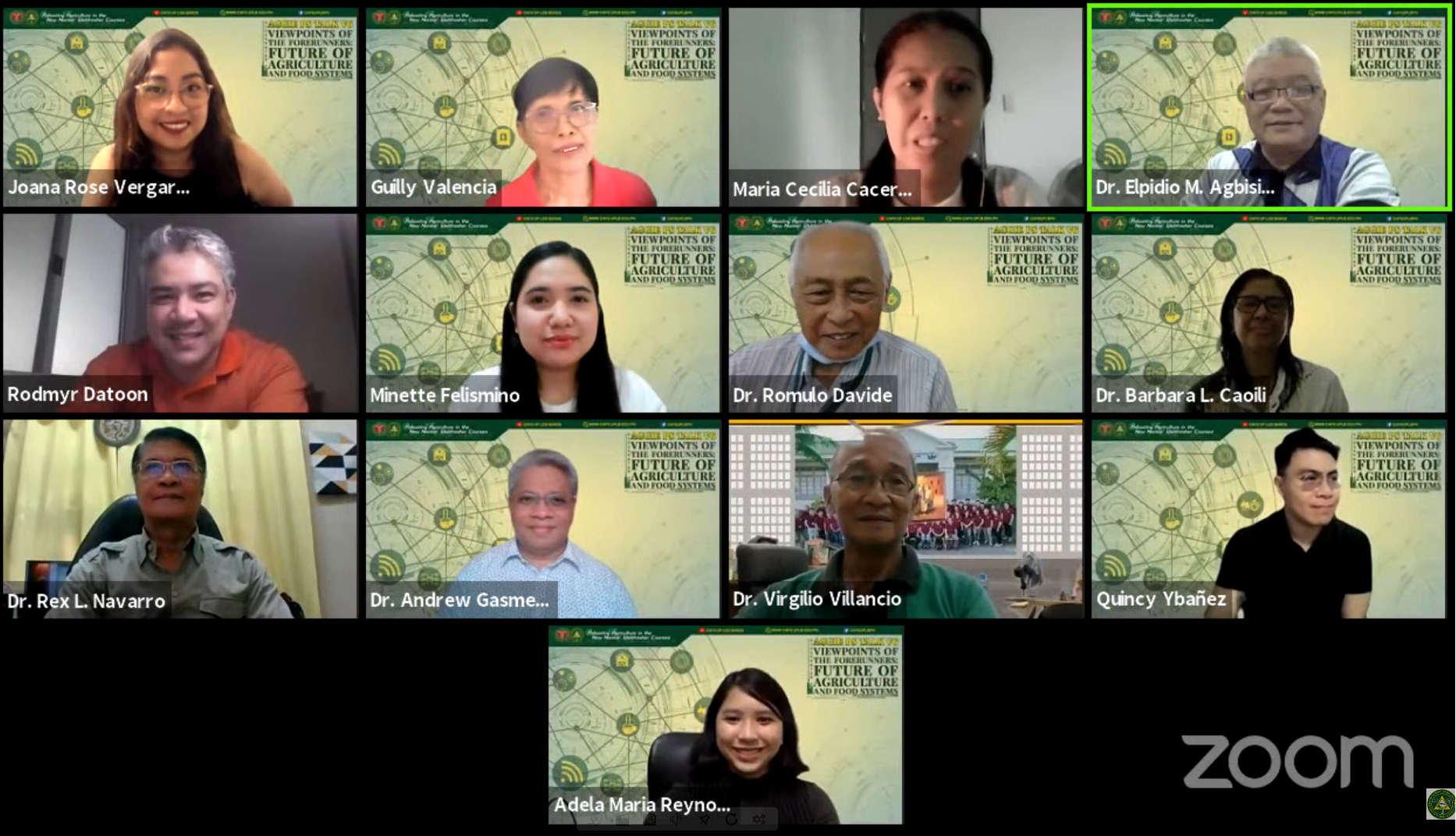APT Season 6 finale episode highlights grit and passion in extension service
The finale episode of Aggie Ps Talk (APT) version 6 featured Dr. Rex B. Navarro, an agriculture frontrunner in the field of extension service. Dr. Navarro is an international expert on agricultural extension, development communication, social marketing, social mobilization, knowledge-sharing and management, development administration, rural development, and strategic planning. As a member of the Coalition for Agriculture Modernization in the Philippines (CAMP), Dr. Navarro advocates for a province-led agriculture and fisheries extension service in the country.
Dr. Navarro started his presentation by discussing the contemporary global and local environment of agriculture and fisheries extension. He said that the Fourth Industrial Revolution offers the converging of the physical, digital, and biological skills. Moreover, he said that the contributions of Artificial Intelligence through robotics, Internet of Things, biotechnology, nanotechnology, autonomous vehicles, 3-D printing, and quantum computing are now felt and appreciated.
With the current agriculture landscape of the 21st century, Dr. Navarro emphasized that farmers need to diversify their crops and products to increase their income. He is hopeful that with the current state of agriculture in the world, modernization of Philippine agriculture can be gradually achieved.
Dr. Navarro also presented the country’s Agriculture and Fishery Extension (AFE) System as a challenged set-up brought about by the Local Government Code and the Agriculture and Fisheries Modernization Act (AFMA). He explained that the monolithic AFE system, the following outcomes were observed:
- Fragmented extension service delivery;
- Compartmentalized implementation of agri-fishery programs;
- Weak RDE farmer/fisher folk linkages; and
- Limited scaling of agri-fishery technologies.
Dr. Navarro also provided an illustration of models of the extension system of Vietnam, Japan, India, and China where the Philippines can draw lessons from in reforming the extension system to modernize agriculture and fisheries in the country. He pointed out that the key to a massive technology utilization is the engine of agriculture and fisheries modernization. He also shared that a modern AFE system should include supporting rural livelihood; multiple sources of innovation; pluralistic institutional arrangement; demand-driven market; and use of digitally-enabled tools.
As an advocate of a province-led AFE system (PAFES), which he considers as his passion, Dr. Navarro cited various reasons for the initiative. First, LGUs are fully empowered to deliver AFES services . With Executive Order 138 or the Mandanas Doctrine, the extension services will be fully devolved to the LGU by 2022. Second, provincial local government units (PLGUs) can co-finance AFE programs with national government. The provinces have economies of scale hence, they can co-finance extension programs with the national government. Third, PLGUs are closer to the challenges of farmers and fisher folks. Since they are in the grassroots, the PLGUs are in better position to address the challenges of farmers and fisher folks more than the national agencies. Lastly, PAFES is the best institutional innovation for decentralizing extension.
Dr. Navarro also provided the following PAFES flagships under the Agriculture and Fishery Modernization:
- Agro-enterprise development along the Provincial Commodity Investment Plan (PCIP) and Department of Agriculture banner programs;
- Technology development, adaptation and demonstration;
- Massive multi-level capacity building;
- Integrated digital advisory services; and
- Institutional strengthening.
With grit and passion, Dr. Navarro narrated the experiences of the members of CAMP in introducing the concept of PAFES to the Department of Agriculture (DA) until it reached MOA signing, and eventually came up with a pilot province.
With the implementation of PAFES in Ilocos Norte as its pilot site, Dr. Navarro proposed the establishment of PAFES in Laguna with UPLB being in Los Baños. Moreover, this is in response to the challenge of DA Sec. Dar during the APT V6 Episode 1 — for UPLB to have a greater impact in its immediate community, Laguna.
Dr. Navarro emphasized that in order for PAFES to succeed, it should have the following elements: 1) political will; 2) strategic management; 3) proven success in pilot provinces; 4) partnerships; 5) innovation and national support; and 6) linkage/collaboration of the stakeholders.
(IMGesmundo)
Watch the episode through CAFS YouTube Channel: https://youtu.be/ftNlem1xb1o





